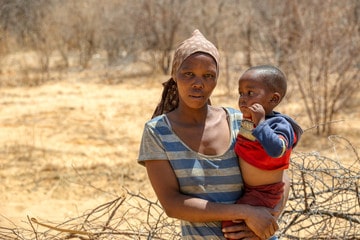Nigerian women face the challenge of certain public health problems in Nigeria, which you need to know about. These health challenges are among the major concerns for women in Nigeria.
This article aims to educate you on the major public health problems facing Nigerian women. These issues vary according to religious, cultural and geographic factors.
Major Public Health Problems Facing Nigerian Women and Solutions

The following are some of the major public health problems that are currently facing Nigerian women, as well as some practical solutions to curb them.
1. Unintended/Early pregnancy
Unintended pregnancy is a pregnancy that is unwanted or unplanned at the time it was conceived.
Unintended pregnancy is a very serious public health problem among our young girls out there and requires huge consideration.
This is because most of these female adolescents with unintended pregnancy often resort to unsafe abortion, which could expose their own health or that of their unborn kids to certain defections, diseases, or even death.
Child marriage is common in Nigeria, and also another cause of unintended pregnancy in young girls. Reports show that 43% of girls in Nigeria are married before their 18th birthday, and 17% are given off into marriage before they turn 15. However, this statistics vary according to the region. [1]
According to reports, abortion rates among adolescents are high than in any other age group, which shows how crucial it is to curb this cankerworm eating deep into the fabrics of the adolescent world.
That being said, it is equally important to state that there are a number of consequences associated with an unwanted pregnancy.
Firstly, research shows that teenage pregnant women are at higher risk of experiencing worse complications among pregnant women attended to in a tertiary teaching hospital in Nigeria.
The commonly reported complications include but not limited to anemia (a common blood disorder characterized by tiredness and weariness), obstructed labor (delay in childbirth that lasts longer than usual), low birth weight (giving birth to a baby weighing less than 5 pounds and 8 ounces), perinatal mortality (pregnancy losses that occur after 28 weeks of gestation), etc.
Additionally, the vast majority of female adolescents with unintended pregnancy in Nigeria also tend to suffer rejection [especially from parents], restricted access to further education, low self-esteem, etc.
Some of them may even be forced to marry/settle down with a partner that they don’t link in a real sense, which in turn could make their marriage a regretful rather than an enjoyable one.
It might interest you to know that the leading causes of unwanted pregnancy includes rape or forced sex, wrong use of contraceptives, poverty, lack of information, inadequate parental care, peer pressure, certain religious practices, to name but a few.
On the other hand, below are some practical ways to curb unintended pregnancy in Nigeria:
- Teenagers should be offered comprehensive sex education
- The Government and other relevant authorities should organize reproductive health services for young adults.
- There should be a regular sensitization of teenagers about the dangers associated with early pregnancy and why they should not engage in any activities that can lead to it.
- The Government should ensure that rapists and sexual abusers are duly punished at the right time.
- Civil society groups, NYSC CDS groups, and other relevant bodies should launch a sensitization program that explains what contraceptives are, their uses, and how to correctly use them.
- Parents and guardians should educate their children on the subject of unintended pregnancy and how to best avoid it.
- Contraceptives should be accessible nationwide, at reasonable prices.
2. Unsafe abortion
This is more or less one of the resultant effects of the first problem discussed in this article [unintended/early pregnancy].
Unsafe abortion is when a pregnancy is terminated by people who lack the necessary skills or done in an environment with substandard medical equipment.
Although this reproductive health problem is widely neglected, the plain truth is that it is responsible for more than 13% of maternal death across the world, with Nigeria contributing a larger percentage. [6]
The dangers associated with unsafe abortion can never be overemphasized as it can lead to any of the following –
- Incomplete abortion
- Infection [sepsis]
- Hemorrhaging [heavy bleeding]
- Uterine perforation
- Damage to the genital tract and certain internal organs
- Abdominal pain
- Shock
Common causes of unsafe abortion include – low community awareness, restrictive laws, Threat to the life of the pregnant woman, misleading information, lack of access to safe abortion, among others.
That said, below are some genuine ways unsafe abortion can be reduced or eliminated in Nigeria:
- Healthcare service providers should provide life-saving medical care to women suffering from abortion-related complications.
- Females, especially young adults, should be provided with comprehensive sexuality education, at home, their schools, communities, and other related places.
- There should be a regular sensitization program about the effective use of contraceptives. This can be done on different media houses, including newspapers, televisions, newspapers as well as online media platforms such as WhatsApp and Facebook groups, forums, etc.
- Safe, legal abortion should be made available where and when necessary.
- The Government should introduce improved technologies and implement interventions that promote safer abortion.
- The Government and relevant bodies should develop/support programs and policies that discourage unsafe abortion and improve access to safe abortion
- The Government should ensure that people who engage in unsafe abortion are prosecuted before the law.
3. Sexually Transmitted Diseases
Sexually Transmitted Diseases, especially the Human Immunodeficiency Virus (HIV), is again another growing reproductive health in Nigeria.
Although there are a number of Sexually Transmitted Infections in the nation, including Syphilis, Chlamydia, Gonorrhea, Trichomoniasis, Herpes, etc. – But the major one we’ll discuss in this article is HIV since it is the leading infection.
With over 1.9 million (1.5%) people living with HIV, Nigeria is considered one f the countries with the highest prevalence of HIV in the world. [2]
In a more detailed report, it was shown that HIV prevalence is higher in the south-south zone of Nigeria than any other part. The region has 3.1 percent, along with North Central Zone (2.0%), South East Zone (1.9%), South West Zone (1.1%), North East Zone (1. 1%) and North West zone (0.6%). [3]
One thing about HIV is that it damages the human immune system and makes the person in question more susceptible to various kinds of infections, diseases, and other invaders.
If not well managed, HIV can further progress into AIDS, which could trigger more serious conditions or even shorten life span.
Aside from higher risks of diseases, it will interest you to know that people living with HIV tend to suffer stigmatization, discrimination, and isolation than most other groups, showing why you must prevent yourself against such health conditions.
Just before delving into how to shield yourself against HIV and other sexually-transmitted infections, below are some leading causal factors:
- Having unprotected sexual intercourse [sex without condom] with HIV-positive patient
- Making use of needles, syringes, and other sharp equipment used by others.
- Blood transfusion
- Mother-to-child transmission, to name but a few.
How to reduce the prevalence of HIV and other STIs in Nigeria?
- Individuals should always make use of a new condom during any sexual intercourse.
- The habit of sharing needles, syringes or other sharp equipment should be stopped/shunned by all and sundry.
- HIV-positive moms should avoid breastfeeding their babies to avoid transmission.
- Young adults should be exposed to adequate sexuality education.
- Quick treatment should be offered to people diagnosed with HIV, immediately it is discovered.
- The Government should adopt policies and strategies to address some of the reproductive health problems faced by young people.
- Information about family planning should be broadcasted regularly across the major social media and other platforms with a higher number of young adults.
- Non-governmental organizations [NGOs] should organize a program where free condoms will be made available, along with the importance of using it.
- Non-governmental organizations [NGOs] should organize a program for testing and counseling people with HIV and other STIs.
- Young adults should be given access to sexual and reproductive health information and services
- Adequate care and support should be given to HIV-positive patients to minimize AIDS-related stigma.
- The Government should invest more in programs and policies that promote better HIV protection.
- People who want to tattoo their body should patronize licensed studio where all the necessary equipment are readily available and properly sterilized.

Other Public Health Problems Facing Nigerian Women:
Some other health concerns that are currently facing Nigerian women include:
- Female genital mutilation
- Gender-based violence
- Maternal Mortality
- Domestic Violence
- Child labour. [4] [5]



